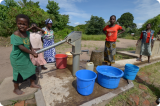
The food challenge in Africa in terms of its water resources (Policy Brief 329 - April 2013)
In 2030, the increase in population, urbanization and changes in dietary habits in Africa should lead to a sharp increase in food needs. Increased variability of water resources in time and space and frequency of extreme weather events, due to climate change, constituerons one major challenge for African states because of their impact on the availability of water resources and thus crop yields.
- The food challenge in Africa in terms of its water resources
The fourth report of the Intergovernmental Panel on Climate Change (IPCC) published in 2007 noted that, in the future, agricultural production and access to food could be severely compromised by climate variability and change climate and, in some countries, agricultural output dependent on irrigation by rainwater could decrease by 50% by 2020. In fact, in 2030, the African population, which quadrupled between 1950 and 2010 is expected to increase by half, dropping from 15% to nearly 20% of the world population . Added to increasing urbanization and dietary rapidly evolving on the African continent, this population growth would lead to a significant increase in food needs. Simultaneously, climate change will cause greater variability in water availability and thus have a significant impact on crop yields.
In this context, if current trends continue, the continent can not feed its entire population without imports . In North Africa, the development of agriculture should be primarily constrained by the limits of potential arable and low water. Saharan Africa, despite the availability of land and water resources, the rate of population growth and economic locks constitute significant obstacles to self-sufficiency.
Agricultural production in Africa and, by extension, its ability to feed its population, depend largely agricultural policies, energy and land that will implement the African governments. They will also be conditioned by the ways that international institutions (governmental and nongovernmental) will mobilize in favor of small farmers and various forms of agriculture and irrigation they practice. In this context, the research culture systems better adapted to their environment from conservation agriculture, the development of more efficient irrigation, the development of mixed farming systems conciliatory intensive farming and food limitation and time assigned leases to private investors are all avenues to explore.
Summary
- Water: a good increasingly strategic for Africa by 2030
- Issues in greater food security facing an agricultural sector with strong potential but vulnerable in the context of current and future
- Adaptation of the model tracks and agricultural water management in Africa in 2030
- Author: Clelia Godot, Sustainable Development Department
Keywords : water, Africa, food security, agriculture, climate change.

